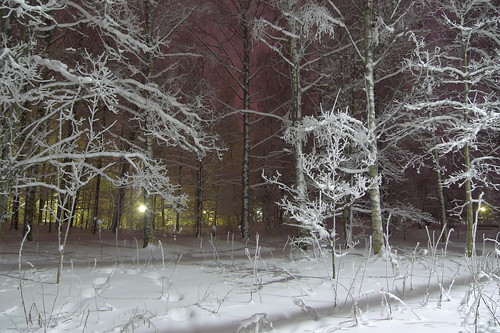A shop in Finland is currently selling the combo of E-P1 and the Panasonic 20 mm f/1.7 pancake lens for 800 euro. Also VF-1 is included (the optical viewfinder). And as a bonus, you get the flash unit FL-14 for free from a Olympus promotion (valid until January 31, 2010).
This seems a rather good deal. The combination of the image-stabilized body of the E-P1 and the f/1.7 lens is very close to my imaginary "Finnish winter camera", (almost) able to shoot handheld in available light this time of the year. Basically, it provides an improvement of 2.5 - 3.5 stops over the Panasonic LX3, if you estimate that ISO 400 (or 800) on the E-P1 is the same as ISO 100 on the LX3.
The images shown here were taken with a mini-tripod and the LX3. It would be possible to get rid of the mini-tripod with the E-P1 and shoot handheld only.
But I'm still debating. I like to keep things simple, and the LX3 is a simple tool to use. Learning yet another tool doesn't seem an attractive proposition at this moment.
But... I'm still debating.
BUSINESS HOURS:
3 hours ago





2 comments:
The colors and the motion blur in #1 work very well for me.
I understand your rationalizing about the E-P1: Usable high-iso is really good for some geographic areas, where (as a working person) you don't get too much of daylight during considerable parts of the year. And the combo still would be pocketable... The only thing you loose is the zoom, but that could be added in form of another prime later on. And of course - 20mm is more a normal focal length instead of the wideangle you were using quite often in your images.
If I wouldn't have invested that much in my SLR (which delivers good results, yet is heavy and bulky) I would see this definitely as a tempting opportunity.
One of the possibilities of the E-P1 would be to use my old Minolta MD lenses (with an adapter), this also interests. But have to see.
I expect to see one ISO stop improvement in the micro 4/3 cameras within two years, so at that stage the cameras would be really, really good for my purposes. And some nagging details would be probably fixed.
Post a Comment